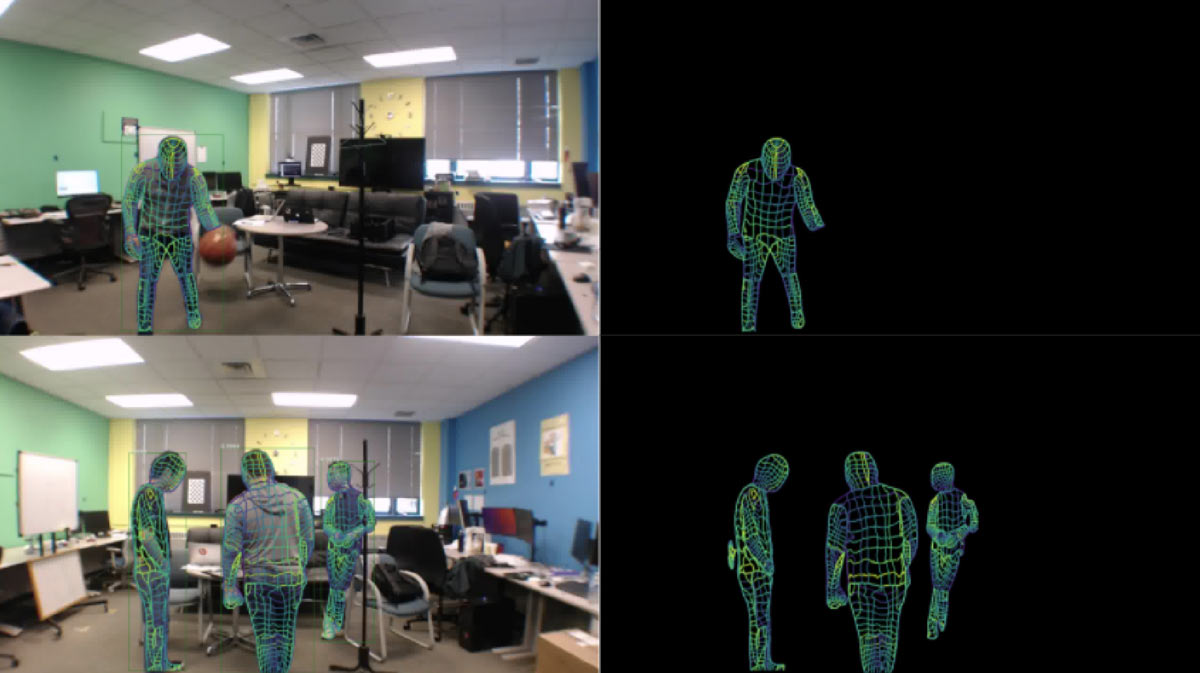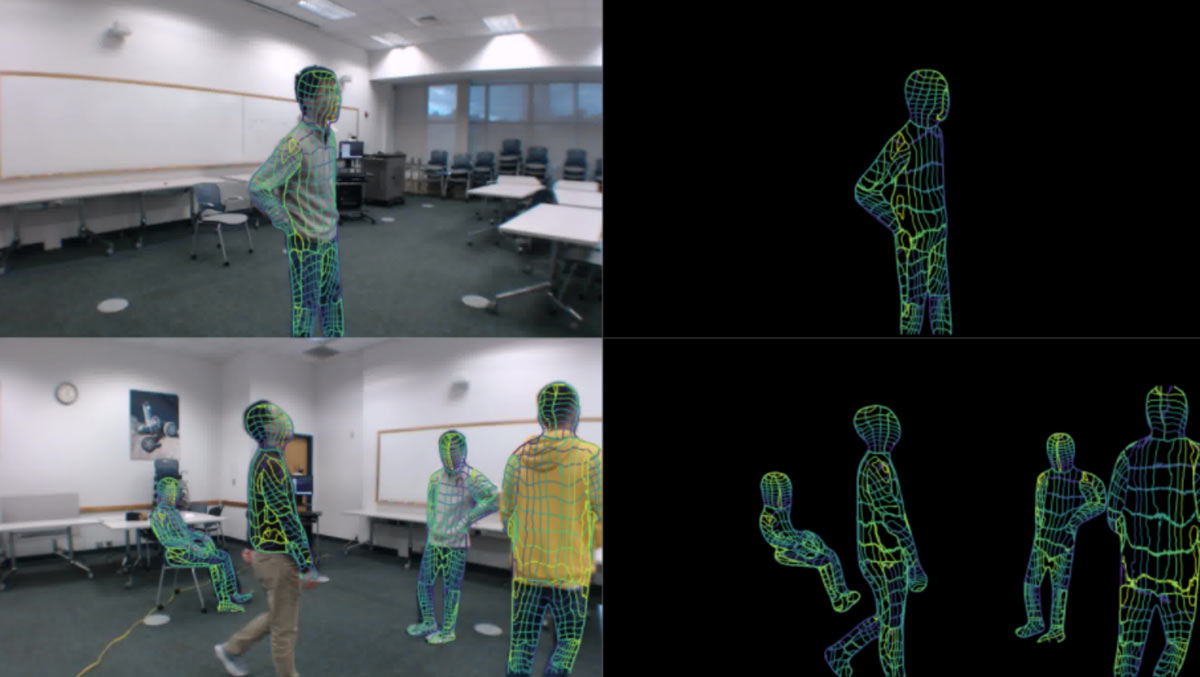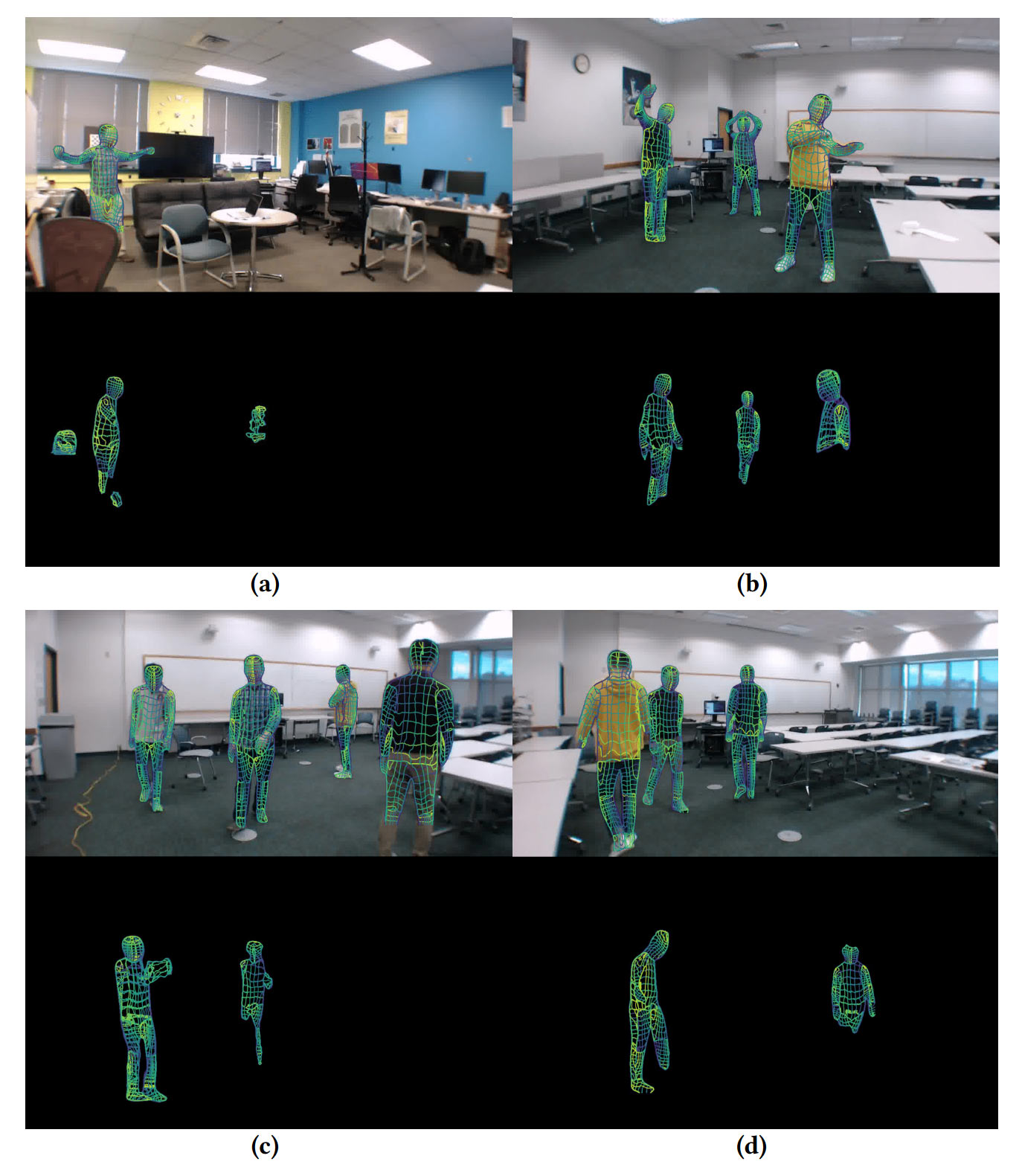Wi-Fi Routers Used to Detect Human Locations, Poses Within a Room
Wireframe images generated by AI look pretty accurate compared to ground truth video feeds.
Get Tom's Hardware's best news and in-depth reviews, straight to your inbox.
You are now subscribed
Your newsletter sign-up was successful
Researchers at Carnegie Mellon University have been testing a system which uses Wi-Fi signals to determine the position and pose of humans in a room. In the tests, ordinary Wi-Fi routers, specifically TP-Link Archer A7 AC1750 devices, were positioned at either end of the room, along with various numbers of people in the room. AI-powered algorithms analyzed the Wi-Fi signal interference generated by the people.
Wireframe images generated from the Wi-Fi monitoring looked pretty accurate in most cases, with the researchers asserting that the estimates are as good as some “image-based approaches.” There are some advantages and attractions for using Wi-Fi over cameras, too. Firstly, the wireframe estimations of human pose are more respectful of human privacy. Secondly, Wi-Fi based perception doesn’t require light, and is capable of detecting body poses even when there are objects in the way which would obscure a traditional camera view. Another major attraction of this discovery is that the Wi-Fi routers used were cheap at just $30 each, and thus much more accessible than expensive and power hungry solutions such as radar and LiDAR.


Above you can see a set of synchronized images, with the video stills on the left, and the AI-generated Wi-Fi sensed wireframes on the right. The detection of the number of people, locations and poses looks very accurate. The paper published by the Carnegie Mellon researchers provides some detailed background on how this is done. In brief, the Wi-Fi based perception technology demonstrated here is based on Wi-Fi signal channel-state-information (CSI), which represents the ratio between the transmitted signal wave and the received signal wave. This data is processed using a computer vision savvy neural network architecture that can perform dense pose estimation. To simplify and thus speed the generation of the wireframe style human representations, the researchers broke the human form into 24 segments.
The researchers admit that the above outlined method of detecting humans and their positioning / poses is not without issues, and they still see some obvious errors in test scenarios. They graciously provided some comparison images which show “failure cases,” which they attribute to issues such as humans making unusual poses and there being too many subjects in the room at once (the engine optimally supports three or fewer individuals).

There is still plenty of work to be done, with the researchers suggesting the outlined technique could be improved in a number of ways but mainly from better public training data for Wi-Fi based perception, especially in different room layouts. While touted as a privacy sensitive way to monitor the safety of old people living alone, and being a very affordable solution for this purpose, some will undoubtedly be concerned about the new threat of their Wi-Fi router spying on them.
Get Tom's Hardware's best news and in-depth reviews, straight to your inbox.

Mark Tyson is a news editor at Tom's Hardware. He enjoys covering the full breadth of PC tech; from business and semiconductor design to products approaching the edge of reason.
-
PlaneInTheSky ReplyFirstly, the wireframe estimations of human pose are more respectful of human privacy.
Sure it is...
"So we replaced our cameras with the wireframe Wi-Fi system. But it's hard to recognize anyone."
"Well, that obese person in the middle is clearly John. And the short one is Marry. As long as we tag our employees by body features we can recognize them." -
jkflipflop98 Look at everyone freaking out over "muh privacy!".Reply
Yet you'll line up overnight to pay a premium for the latest version of a device that listens to everything you say and reports your position at all times. -
zoridon Reply
Actually I don't line up all day for anything especially to pay extra just to get a gadget 1 month before anyone else but I get your point. Digital privacy should be required in HS curriculum nation wide.jkflipflop98 said:Look at everyone freaking out over "muh privacy!".
Yet you'll line up overnight to pay a premium for the latest version of a device that listens to everything you say and reports your position at all times. -
atomicWAR Replyjkflipflop98 said:Look at everyone freaking out over "muh privacy!".
Yet you'll line up overnight to pay a premium for the latest version of a device that listens to everything you say and reports your position at all times.
I do my best on privacy and I am not one to wait in a line. I'll snag what ever tech toy online when I snag one online and only when I can reasonably afford it. As a paraplegic with fairly catastrophic chronic pain, queuing up in cold weather for a status symbol while paying to give my privacy/rights away for a cell is just is not my thing. But I don't think you had me personally in your sights.
You're not wrong about the vast majority of sheeple in regards to cell phones (and a lot of other tech toys). I've honestly thought of ditching my cell all together. I only keep it at this point as a security blanket should I fall out of my chair or need some emergency assistance regardless of my location (mostly). I've thought of down grading to a flip phone as well but even when you get a non google/apple based product your still stuck with GPS and cell towers broadcasting your location for those who know how to look. In the end there are better options to protect your privacy but its nearly impossible to avoid completely without disconnecting from everything which most folks just won't do these days.
Man that convo made me want to look for flip phones yet again.... have a good one jkflipflop98!
edit: yes I get the irony of what I said with my current system but plz keep in mind I came from a ten year old x79 mobo w/ a used 1680 V2 running a 2080ti all water cooled...in my new build I could have left the 2080ti until GPU prices dropped below msrps (I got an msrp 4090 not a scalped card) but I honestly didn't want to water cool my GPU again due to the hassles of timing gpu buys with my yearly water maintenance or having to do a seperate drain of my system to install an upgrade. Plus all hassle of not being able to easily troubleshoot other GPUs on my system and general easy access to PCIe slots/SATA. controllers which again frequently required me to drain my system. Using only a CPU water block makes it all go away...I got lazy in middle age. -
cyrusfox Reply
I have been hearing about this capability for years... I would be surprised if it isn't already actively in use and abuse by state party actors. While we don't have another Snowden coming forward to openly reveal what the 3 letter agencies are up to, this is likely one of the many tools at their disposal.atomicWAR said:Because this won't be misused and abused... -
pointa2b I'm sure the FBI/NSA have no interest abusing this at all... lol.Reply
This is why I don't care about WIFI 8 or whatever is being shoved down our throat nowadays. Wired devices are the way to go if you value your security. -
cyrusfox Very relevant clip, 15 years oldReply
IRELLH86EdoView: https://www.youtube.com/watch?v=IRELLH86Edo
Same concept, different frequency application -
CtrlAltSpoods Shopping centres/Malls have been doing this for over a decade, it's one of the main drivers to provide 'Free Wi-Fi', it's in the T's and C's that no one bothers to read that they can attempt to grab location data and use it how they please.Reply
They then process this data to work out what shops are the most popular, and where foot traffic is the heaviest. (Possibly adjust rent price based on this data? I do not know)